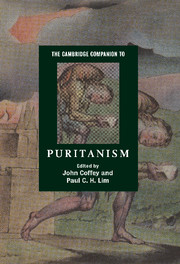2 - The growth of English Puritanism
from Part I: - English Puritanism
Published online by Cambridge University Press: 28 November 2008
Summary
In the last week of March 1585, nine clothiers from the small market town of Dedham in Essex resolved some sober business. The local vicar, Richard Parker, who commented afterwards upon the business, described what took place as a 'protestacion' and noted, significantly, that 'it was offered them the 20 of march 1585'. Yet the surviving text calls itself a 'profession freely made and approved by the voyces and handes of us whose names are underwritten' and the terms are revealing, for this was no simple set of orders akin to those found in other larger boroughs concerned primarily with the pressing issues of unemployment, poverty, unlicensed alehouses and the social order. Although the word covenant is nowhere used, the text makes clear that what was agreed in March was a covenant, perhaps the earliest recorded example of such in the Elizabethan church. In a series of solemn oaths or promises, the Dedham clothiers expressed their determination to be the sharp edge of reformation in their community, so many godly exemplars for their poorer, illiterate neighbours. Eleven times, promises were made 'reverently' or 'willingly' to encourage participation in Dedham's monthly communions and weekly lectures, to extend hospitality on Sundays to 'the poorer and weaker sort', to use all means to correct and reform those who misbehaved in church or who profaned the Sabbath day and to uphold the credit of the godly preachers. The Dedham covenant predates the more famous covenant agreed in 1588 between Richard Rogers and twenty of his Wethersfield (Essex) parishioners who were said to 'exceed the common sort of them that professe the Gospel'.
- Type
- Chapter
- Information
- The Cambridge Companion to Puritanism , pp. 34 - 47Publisher: Cambridge University PressPrint publication year: 2008
- 5
- Cited by



